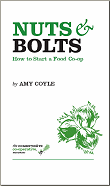Tories champion food co-ops to counter supermarkets' power
by Gaby Hinsliff The Observer
David Cameron will today back moves to break the supermarkets' stranglehold over farmers by setting up US-style neighbourhood food co-ops. Fashionable among liberal foodies, the co-op movement champions locally produced, seasonal food bought direct from suppliers, reducing the 'food miles' from farm to plate by comparison with supermarket air-freighted produce.
Stores are set up by groups of like-minded people who club together to buy in bulk and often work voluntarily in the shops - meaning groceries can be sold to members at a heavy discount, but suppliers are still guaranteed a fair price.
Cameron is expected to highlight the idea in a speech tomorrow to the National Farmers' Union, whose members are campaigning against what they say are unfair attempts by supermarkets to force down prices at the farm gate. Jesse Norman, a Tory activist close to the Cameron inner circle who chairs the Conservative Co-operative Movement, will this week launch a book explaining how to set up food co-ops in Britain.
'Supermarkets are fantastic ways of getting a wide range of goods at low prices, but there are all kinds of problems associated with them. A big one is that they have disconnected the provision of food from the local area,' said Norman.
The debate follows proposals from the Competition Commission for an independent ombudsman to rule on farmers' complaints against supermarkets, amid what farmers describe as a 'culture of fear' generated by the big chains' attempts to keep their costs down. They have highlighted tactics including forcing suppliers to meet the cost of 'buy-one-get-one free' promotions and ditching suppliers who publicly complain.
Farmers' markets are popular, but co-ops take the idea a step further by requiring a community to work together to operate the shop. They can also deliver discounts of up to 40 per cent, whereas farmers' markets tend to be more expensive.
The co-operative movement in the UK is traditionally associated with the Labour party, while in the United States it grew out of hippy principles. But Norman said there was nothing wrong with the Conservatives appropriating it: 'There's nothing in what it is to be a co-op that places it anywhere in the political spectrum.'

